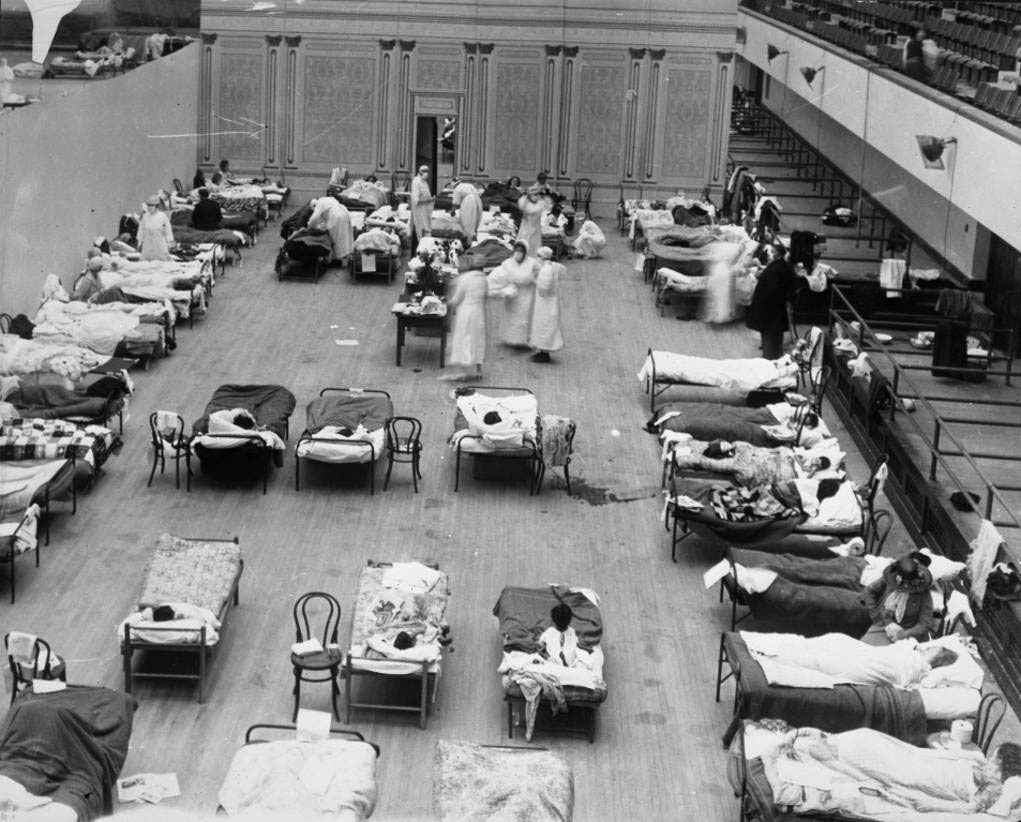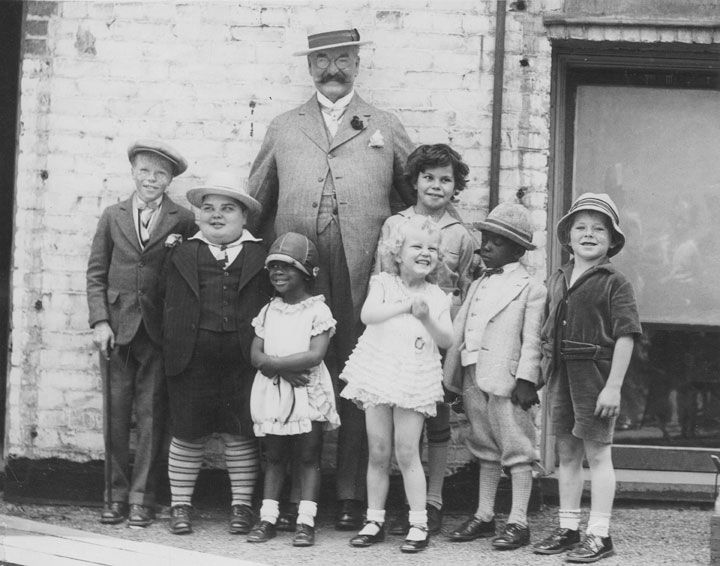In 1919, the Mayor of Oakland Was Arrested for Failing to Wear a Mask
John L. Davie was a larger-than-life politician, but during the influenza pandemic, even he wasn’t above the law
/https://tf-cmsv2-smithsonianmag-media.s3.amazonaws.com/filer/02/ba/02ba019d-51e0-4e39-b351-bbf33ef01cd5/mask_man3.png)
Starting in 1918, as the Bay Area suffered through the flu pandemic, Californians crafted masks of gauze, an open-weave fabric perhaps hard-pressed to stop microscopic particles, even when folded to a thickness of six, as the Oakland Red Cross advised. As a hub for soldiers returning from war, Oakland and San Francisco were targeted by influenza. By the end of the pandemic in 1920, around 1,400 Oaklanders had died of the disease.
The city’s mayor, John L. Davie, was in his second stint of an eventual five in the executive office when the pandemic struck. The walrus-mustached gentleman (in photos he resembles the Monopoly man) had already experienced much excitement, serving as a mule driver on the Erie Canal as a youth, fleeing Chicago’s Great Fire before winding up as an opera singer in San Francisco (also, rancher, butcher, actor, attorney, and bookstore owner).
“He led a really colorful life,” says Dorothy Lazard, head librarian of the Oakland History Center, “which probably contributed to his arrogance, because he had accomplished so much in his life.” Davie was “always dapper,” Lazard says, and usually wore a red carnation in his lapel: his deceased wife’s favorite flower. She notes that in 1917 the press praised him for being the most handsome mayor on the coast, “like that’s a category to live for,” she adds dryly.
To combat influenza, which first arrived in Oakland in early October 1918, Davie, upon the advice of the City Health Officer, was ready to take strong measures...but not too strong. On October 18, 1918, he announced that all schools, churches, theaters and “assemblages either public or private” were forbidden until further notice. Saloons were originally included in the closure notice, but Davie took the liberty of eliminating them, asking only that paper cups be used, and all utensils sterilized. Since all other avenues of entertainment were closed, the city saw a record number of arrests for drunkenness over the weekend after the closures.
A week later, the city council passed a mandatory mask ordinance with Davie’s blessing. Everyone on the street was now ordered to wear a gauze mask or face arrest. City Councilmen had been persuaded at a special meeting the previous day from the famous physician Woods Hutchinson, who pointed to two examples: the men of Fort Wheeler in Macon, Georgia, who donned their gas masks upon the “alarm of the spread of influenza being sounded” and therefore experienced not a single case of flu, and the folks at the state penitentiary, reform school and home for feeble-minded women in Massachusetts: “These institutions escaped, I believe, because of their total isolation from the outside world,” said Hutchinson.
The city transformed its grand municipal auditorium into a quarantine space. Painted backdrops showing a grand Greek columned interior provided “walls.” Above the sick patients , thousands of empty auditorium seats added to the cognitive dissonance of fighting disease in the public arena where they’d once attended the circus, sporting events and concerts. (The Beaux Arts building is a city landmark; Martin Luther King, Jr. spoke here in 1962 on the occasion of the 100th anniversary of the Emancipation Proclamation; it’s currently vacant and awaiting planned restoration.)

On Armistice Day, November 11, 1918, nurses piled out of the auditorium onto the streets, still masked, to celebrate the end of the war. The Oakland Tribune ran the headline: “Thousands in pandemonium over peace,” over a story that mentioned residents being roused out of bed by red, white and blue pyrotechnics and the blowing of “every whistle” in the city. “Everyone was smiling under his mask—their eyes showed it—the noise proclaimed it—and confetti scattered over it,” read the report.
The ad hoc hospital, which had tended to thousands of patients, closed on Nov. 15, as the virus seemingly roared out of the city as quickly as it arrived. Four days later, the council lifted the mask ordinance.
Yet the flu wasn’t quite finished; relief was short-lived, as authorities in Oakland and neighboring cities met on New Year’s Eve in concern over increasing influenza cases.
Some cities, such as Sacramento, had reinstated their mask ordinances. Mayor Davie had come to the California capital to petition the legislature for money for harbor development in Oakland. He was relaxing in a Sacramento hotel lobby on January 16, 1919, when plainclothes officers came into the hotel. The Sacramento Bee said the police “espied the Mayor of [Oakland] sitting in a chair, with his mask gracefully draped over one ear. As they approached, Davie put the mask in place, probably noting that the men had the air of officers.” Three of the officers admonished him to wear it properly, but when they had turned away, according to the newspaper, he pulled it off and resumed a perhaps-cheeky inhale of the cigar he’d been smoking. When the officers glanced back and saw the mask again out of place, they arrested him.
Davie was brought to jail because the officers couldn’t make change for his $20 bill; bail was $5. On the way—a long, nine-block walk—he threatened to ring the capital city’s police commissioner and burst into swearing, language “too foul to repeat in print,” said the Bee. He ranted against the hotel not being able to protect its patrons, cast aspersions on the doctors who passed the mask ordinance, and declared, “If a member of the Oakland police did a trick like this, I would put him off the force.”
Under the smirking headline, “Mayor Davie gets ‘huffy’ when pinched,” the Sacramento Star reported that he fumed that he’d spend the night in jail before he’d put up the bail, but changed his mind once at the police station.
Another paper, the Pomona Progress, reported that during the walk to the station, Davie and the officers passed several people without masks who were not taken into custody: “I suppose they did not look sufficiently prosperous to pay a fine,” Davie reportedly said.
He cooled his heels in the Sacramento jail until another man was arrested with enough cash to make change. As chance would have it, some Oakland police officers were also in Sacramento lobbying for a police pay amendment. “When we got to the mayor, he was shaking with anger,” said Oakland Police Department Captain F. J. Lynch to The Oakland Tribune, adding that Davie was further enraged that none of the policemen within the Sacramento sergeant’s office were wearing masks. “I certainly gave them a piece of my mind,” Davie told the Tribune, “and I am going to write to Mayor Carmichael to put the police on a cash basis so that they can change bills.”

Davie failed to make his court appearance the next day, “and the five-spot was added to the city’s exchequer,” said the Bee. It turned out he wasn’t the only governmental authority to be caught; state senator Edwin Otis of Alameda was arrested the same night as Davie in what the Progress called “mask raids.” Sacramento’s Chief of Police Ira Conran told the Bee he would make no exceptions for legislators in town from other cities. An officer who noted the high numbers of fines remarked, “Say, is Ordinance 373 a revenue ordinance or a health ordinance?”
While Davie was away, the Oakland City Council had passed a mask ordinance to become effective January 22. Upon his return to Oakland, the Bee gleefully noted the irony under the headline, “Poor Mayor Davie—He Can’t Escape the Influenza Masks.” Davie was incensed that council members had taken an action they knew he was against, noting that they would have read newspaper reports of his Sacramento arrest. “Mayor Davie declared that when the ordinance comes up for his final sanction he will use every effort to prevent its becoming a law” and “promised to read the riot act to Commissioners,” said the Bee.
“Davie loved a fight, and he got plenty while he was in office,” wrote Beth Bagwell in Oakland, Story of a City. “He survived numerous recall attempts and various court efforts to oust him… He sparred with enemies with the same zest with which he had roped wild horses on his ranch…”
The Oakland City Council met again on January 21 for final passage of the mask ordinance, and Mayor Davie was there to fulfill his promise of thwarting it. “The mayor leaned back in his throne and ruminatingly called Sacramento a jay town [an insult akin to calling someone a bumpkin or a hillbilly] because the officer who pinched him had to go out and arrest another man to get change for the $20 Mayor Davie presented to pay for his fine,” said the Stockton Daily Evening Record.
Other newspapers wouldn’t call him anything so relaxed as “ruminating.” The Tribune said he provided “vigorous protests,” along with Christian Scientists, labor representatives, and others who packed the lobby outside the chambers. The blustery mayor undoubtedly felt an injury to his pride that could be redressed by Oakland’s rejecting the mask ordinance. “He had a larger than life persona,” says Lazard. “He always wanted to see his name in the paper.”
That night, Davie was “the first to have a fling at the flu mask” and “recounted with a great deal of emotion” his arrest and his wait for another cash-carrying scofflaw, wrote the Tribune. Daniel Crosby, the City Health Officer, was the only one in council chambers wearing a mask. The cowed council, bowing to pressure, voted to lay the ordinance aside, to be revisited in case of emergency.
Diplomatic relations between the two cities’ police departments were strained after the incident, and the city’s papers fanned the flames. The Oakland Enquirer ran an op-ed saying that Davie’s indignation was “entirely justified” and calling for the Sacramento mayor to “punish his police” and apologize to Oakland. “The act of the police was like that of a country constable nabbing a tramp for being abroad without his blankets. It was raw, rank, and unbecoming,” groused the Enquirer. But the Sacramento Bee took up the cause of defending its city and even Oakland, saying that Mayor Davie “insulted the good men and the good women of the city of which he is mayor by his outspoken scorn for a health regulation of a sister community.”
It seems Mayor Davie’s vehement rejection of the mask was ill-thought-out. Across the bay, San Francisco’s public health officer noted that in his city, within three weeks of general adoption of the mask, the number of cases were cut more than half –and that within one week of its being cast aside after the disease being virtually wiped out, a marked increase began. Sacramento, too, reported cases dropping to a minimum after mask use was mandated.
Paul Burnett, historian at the Oral History Center of the Bancroft Library at University of California, Berkeley, says the gauze masks of 1918, “may not have been much use to the user but did offer protection to those around them.” During the current COVID-19 pandemic, Americans everywhere are getting used to the idea that mask wearing will be around for the indefinite future. And while some politicans have delivered public messages while donning masks, others, like Mayor Davie more than 100 years ago, have declined the opportunity.
To Burnett, among the lessons of 1918 is that on top of the protection they may offer, masks also “serve as a social signal to remind people that there is a contagious disease out there, that contact with others is dangerous.”